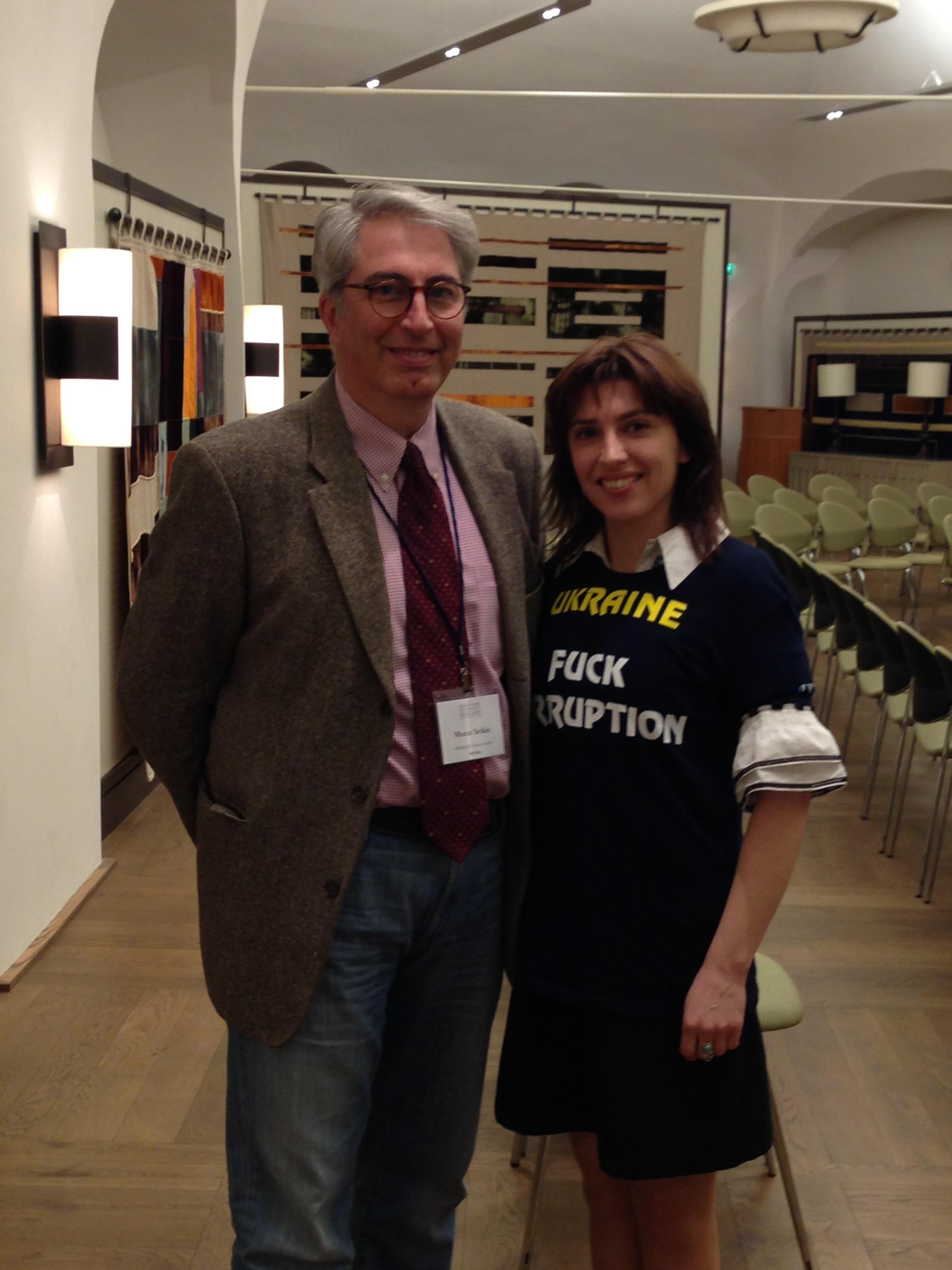Corruption kills democracies

 The stars of the World Forum on Governance in Prague, with the title “Fight against Corruption,” were two young Ukrainian women.
The stars of the World Forum on Governance in Prague, with the title “Fight against Corruption,” were two young Ukrainian women.They showed up in the opening reception on the evening of April 9 in Saint Augustine Hotel, which was once the brewery of the monastery bar, in uniform-like T-shirts.
No, they didn’t show what was written under their shirts, like their Femen compatriots in protests, but rather what was written on their shirts; but it was still shocking: “Ukraine F..k Corruption.”
“Considering the situation in Ukraine,” I dared to ask, “Isn’t the situation vice versa? I mean, corruption is ruining countries. My country is no exemption.”
Halyna Senyk, a sharp lawyer and a founder of the anti-corruption PEPWatch, who had come directly from Kyiv’s Maidan Square, gave me a glare and asked back: “Where were you, you Turks, when the Russians were taking Crimea from us?”
I must admit that I wasn’t expecting this response as an answer to my corruption-related question. I tried to answer Senyk and her friend Daria Kaleniuk, another sharp lawyer from the anti-corruption Action Center, and also others wondering how on earth Turkish Prime Minister Tayyip Erdoğan could win the recent elections amid a shower of corruption allegations.
I am not sure whether my answers satisfied those trying to understand what is really happening in Turkey, but in the opening speech the next morning, Stephen Davis of the Washington DC-based Brookings Institution said something closer to what I had told Daria and Alena.
“Corruption is a mortal threat to democracy and markets. The meltdown of the last Ukrainian government is an example,” he said. Toward the end of the opening panel with title “The struggle for good governance in Central and Eastern Europe,” the moderator forced the panelists to give one and only one reason as the source of corruption.
There were usual - and correct - answers, such as the lack of transparency in the financing of politics, or the lack of the rule of law. But one of the answers was different and interesting. David Ondracka, the head of the Czech branch of Transparency International suggested that it was the “privatization of politics.”
OK. Why Czechs and why Ondracka? A few years ago, during the worst of the economic crisis, a survey was carried out in 27 member states of the European Union. People from 25 countries, including Greek Cyprus, reportedly named Greece as the most corrupt. The Greeks said it was Italy. Only the Czechs said that it was themselves.
Ondracka gained prominence during the social struggle for that kind of awareness and became a symbol of the anti-corruption struggle in his country.
Last December, at about the same time that the Turkish prime minister had to leave four of his ministers out of the Cabinet because their names were mentioned in the major graft probe opened on Dec. 17, the Czech PM offered Ondracka the Interior Ministry post in order to conduct his anti-corruption program.
Many Czech politicians and NGO leaders tried to convince him. Even the U.S. ambassador to Prague, Norman Eisen, who was himself an anti-corruption campaigner before entering the White House as part of Obama team, thought it was another unusual opportunity for a reformer to be in government.
But Ondracka said no. He thought it would disappoint those who believed in him and his struggle against corruption to step up to a post thanks to the credibility brought by that struggle. So he stayed with Transparency International.
Ondracka believes that politics is becoming increasingly dominated by those who have big money, or those supported by them, which both discredits the concept of politics in democracies and also causes the perception that people are going into politics to make money.
Pietro Grasso is the head of the Italian Senate. He has spent his whole professional life, before getting into politics, as a man of law struggling against corruption and mafias.
“The current intentional economic situation provides an opportunity for mafias and the corrupt to consolidate their positions and enrich themselves further,” Grasso said, addressing the forum.
Isn’t it clear enough?
Corrupt money is the theft of the welfare and happiness of people who are actually the victims of corruption. This is why concepts like “corruption as a violation of human rights” or “the founding of an International Court of Corruption” were discussed during the forum. Corruption is everywhere. But corruption allegations are not immediately and properly prosecuted everywhere, and those who are responsible do not face always the consequences.
And perhaps it is a wrong generalization to say that corruption is killing democracies. Corruption is killing developing democracies, where those who want to investigate corruption - rather than those who are accused of it - are prosecuted.
And what could I have said to Halyna and Daria about the Crimea? That the Turkish people really do not want to be dragged into another civil war, and that Erdoğan, whose friendship with Russia’s Vladimir Putin was not even affected by the Syrian civil war, and that Turkey is more dependent on Russian natural gas in its electricity production than Russia itself, and that Erdoğan has a chief economic advisor who thinks there are “two and a half real leaders left on earth” - Erdoğan and Putin and Obama being the half?
If corruption kills democracies, the fight against corruption should make them stronger.











